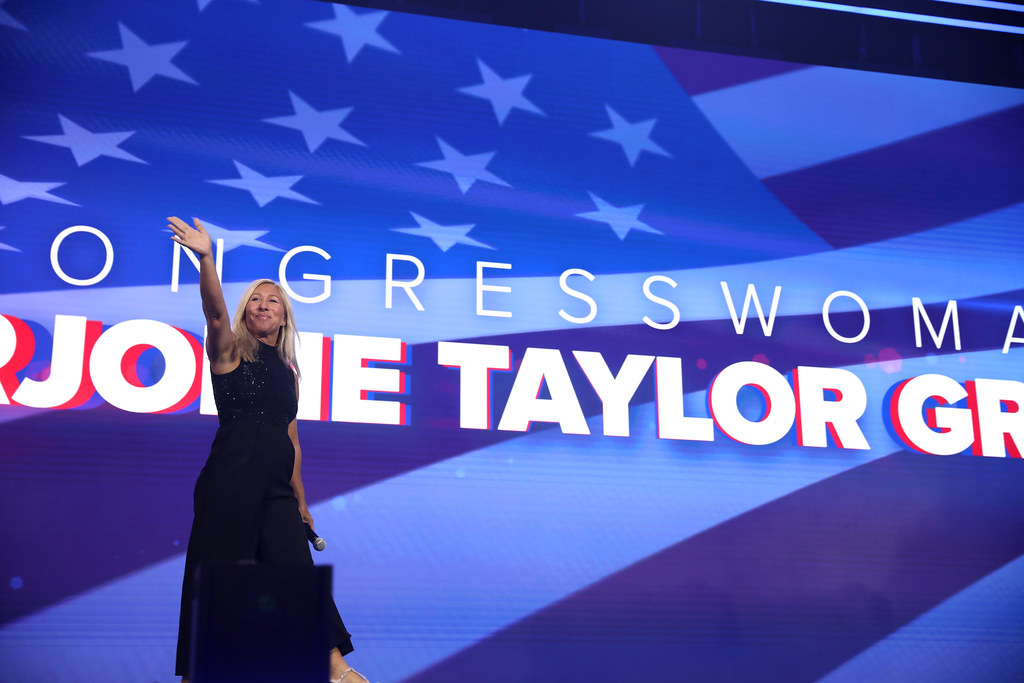
The current political climate in the United States is marked by increasingly polarized rhetoric and profound ideological divides, prompting some prominent figures to propose drastic measures for the nation’s future. Amidst this backdrop, Representative Marjorie Taylor Greene of Georgia has once again brought forth a controversial idea: a “national divorce” between conservative and liberal America. This renewed call, made in a series of social media posts, follows a tragic event that has sent shockwaves through the political landscape and further intensified partisan tensions.
The concept of a “national divorce” suggests a formal separation of states based on their political leanings, a notion that challenges the fundamental unity of the United States. Greene’s advocacy for such a split is rooted in her assertion that the country is “too far gone and too far divided,” a sentiment that resonates with a segment of the population experiencing deep disillusionment with the current state of national discourse. Her latest statements are particularly significant as they directly reference recent acts of political violence, framing them as evidence of an irreconcilable chasm.
This article will provide an in-depth examination of Representative Greene’s proposal, analyzing the specific events and arguments she cites as justification for a “national divorce.” We will explore the details surrounding the conservative activist Charlie Kirk’s assassination, Greene’s outspoken claims regarding its implications, and the diverse reactions from across the political spectrum. Furthermore, we will contextualize these developments within a history of similar rhetoric and past incidents of political violence, seeking to parse out the facts from the pervasive messaging that characterizes this critical moment in U.S. history.

1. **Marjorie Taylor Greene’s Renewed Call for ‘National Divorce’**
Representative Marjorie Taylor Greene, a Republican from Georgia, reignited her call for a “national divorce” on Monday, September 15, following the assassination of conservative activist Charlie Kirk. In a lengthy post on the social media platform X, Greene declared that “Our country is too far gone and too far divided, and it’s no longer safe for any of us.” She stated, “To be honest, I want a peaceful national divorce,” emphasizing a desire for a separation between conservatives and those on the left.
Greene’s statement underscored her belief that there is “nothing left to talk about with the left.” This sentiment indicates a profound breakdown in the possibility of bipartisan dialogue, which she suggests has been exacerbated by recent events. Her use of the term “national divorce” serves as a direct, albeit controversial, proposal for how the nation might address its deep ideological and political rifts, framing it as the only viable path forward for the country.
The phrase “national divorce” has become a shorthand for what critics view as a modern form of secession, signifying a deliberate and formal unraveling of the United States’ current structure. Although Greene specifies her desire for a “peaceful” separation, the implications of such a proposal are inherently serious. It suggests a future where political differences are resolved not through compromise or democratic processes within a unified nation, but through the physical and governmental division of the country, raising significant questions about feasibility and national cohesion.

2. **The Assassination of Charlie Kirk: The Immediate Catalyst**
The most recent impetus for Representative Greene’s renewed call was the assassination of conservative activist Charlie Kirk. Kirk, 31, was fatally shot last week during an outdoor speaking event at Utah Valley University campus in front of thousands of people. This tragic incident has ignited significant political controversy and sent “polarizing shockwaves through political circles and communities across the U.S. more widely.”
The immediate aftermath of Kirk’s murder has been characterized by sharp words and public backlash, intensifying an already tense political environment. The incident quickly became a focal point for discussions on political violence and the state of national discourse. This tragic event served as the direct contextual backdrop for Greene’s assertion that the United States is “too far gone and too far divided” to remain whole.
In the wake of Kirk’s death, several companies, including airlines and American colleges, confirmed that employees had been fired for celebrating the death of the right-wing commentator. This response highlights the intense emotional and partisan reactions that Kirk’s assassination provoked. While investigations into the killing were ongoing, the event was immediately seized upon by various political figures to bolster their arguments regarding the nation’s profound ideological divisions.
Read more about: Erika Kirk Breaks Silence: A Widow’s Vow to Uphold Charlie Kirk’s Legacy and Mission Amidst National Mourning

3. **Greene’s Rhetoric: Accusations Against ‘The Left’**
In her extensive X post on Monday, Representative Greene articulated specific and severe accusations against “the left,” linking them directly to the assassination of Charlie Kirk. She wrote, “There is nothing left to talk about with the left. They hate us,” asserting an irreconcilable animosity between ideological factions. Her post continued, “They assassinated our nice guy who actually talked to them peacefully debating ideas.” This claim directly attributes responsibility for Kirk’s death to “the left,” even as official investigations were still underway.
Greene further escalated her rhetoric by stating that “millions on the left celebrated and made clear they want all of us dead.” This assertion portrays a widespread and malevolent intent among those with differing political views, contributing to an atmosphere of extreme mistrust and fear. Such language not only demonizes political opponents but also reinforces the narrative of an existential struggle, which she uses to justify her call for a national division.
Beyond assigning blame, Greene also expressed a profound disillusionment with traditional political processes and her own party. She claimed that “the Democrats are hardened in their beliefs” and warned that those expecting Republicans to “fight against evil” would be “extremely disappointed.” Her ultimate solution, she concluded, was not political: “Government is not answer, God is.” She advised followers to “Turn your full faith and trust to our Almighty God and our Savior Jesus. Tighten your circle around your family and protect them at all.” This framing suggests a spiritual rather than governmental path forward, reinforcing her call for a shift away from conventional political engagement.

4. **The Role of Political Violence: Condemnations and Blame**
The assassination of Charlie Kirk prompted widespread condemnations of political violence from figures across the political spectrum. However, these condemnations were often immediately followed by efforts to assign blame, particularly from some prominent Republicans who pointed fingers at “left-wing extremism” in the U.S. Vice President JD Vance, for instance, claimed that “the data is clear” and that “people on the left are much likelier to defend and celebrate political violence.”
Vance, while hosting an episode of Kirk’s podcast, “The Charlie Kirk Show,” asserted that the issue of political violence is “not a ‘both sides’ problem.” He maintained that “While our side of the aisle certainly has its crazies, it is a statistical fact that most of the lunatics in American politics today are proud members of the far left.” President Donald Trump echoed this sentiment, stating, “The problem is on the left. It’s not on the right, like some people like to say,” linking “agitators” and “scum” who burn flags to the left.
However, the assertion that violence predominantly stems from one political side faces counter-arguments and differing analyses. The context notes that Vance “did not specify which data set he was referring to,” and that “a variety of analyses, including federally funded research, suggest extremists affiliated with right-wing political causes have killed more people than any other ideological group.” This highlights a significant disparity in how political violence is perceived and attributed across different viewpoints and data sources, complicating efforts to establish a singular narrative.
Senate Minority Leader Chuck Schumer, a Democrat, offered a contrasting perspective, advocating against partisan finger-pointing in the wake of such tragedies. During a speech on the Senate floor, Schumer stressed that “There should be no finger pointing, because this is an attack on our democracy itself.” He warned, “if we fail to quell these fires, our democracy will be doomed,” and emphasized, “We can disagree with our ideas, but not with weapons and bloodshed and killing.” This approach calls for collective responsibility in addressing political violence, rather than assigning blame to one side.

5. **Law Enforcement’s Investigation: Suspect and Motive**
Following the assassination of Charlie Kirk, law enforcement authorities swiftly launched an investigation, leading to the arrest of a suspect. Tyler Robinson, 22, was arrested on suspicion of carrying out the fatal shooting. The Federal Bureau of Investigation (FBI) has indicated that DNA from the rifle and other evidence ties Robinson to the crime, and officials state he acted alone in the incident. These details represent the factual findings from the ongoing investigation into Kirk’s death.
Despite the arrest and forensic evidence, authorities have not yet officially established a motive behind Kirk’s killing. Police are “still searching for a motive,” as the context indicates. Records seen by The Independent suggest that Robinson is “not affiliated” with a specific political party. This lack of an officially determined political motive stands in contrast to the immediate political rhetoric that quickly emerged following the assassination, which rapidly sought to assign ideological blame for the act.
Further complicating the narrative around Robinson’s motivations are conflicting reports regarding his background and potential affiliations. His grandmother, Debbie Robinson, told The Daily Mail that “Most of my family members are Republican. I don’t know any single one who’s a Democrat. I’m just so confused,” suggesting a personal distance from extreme political alignment. However, bullet casings found near the rifle believed to belong to Robinson reportedly had “antifascist inscriptions,” and some of Kirk’s critics had considered him “offensive and provocative,” providing potentially ambiguous insights into a possible ideological leanings not officially confirmed as a motive by law enforcement.
Read more about: Charlie Kirk: Prominent Conservative Activist Dies at 31 After Utah University Shooting, Sparking National Outcry

6. **Reactions from Republican Figures: Support and Denouncements**
The call for a “national divorce” and the broader discussions surrounding political violence have elicited varied reactions from within the Republican Party, demonstrating internal divisions on these extreme proposals. Vice President JD Vance, for instance, publicly aligned with the sentiment of blaming “left-wing extremism” for the political climate, hosting an episode of Charlie Kirk’s podcast where he claimed, “the data is clear” on the left’s propensity for defending political violence. This indicates a segment of the party supporting a confrontational stance.
Former President Donald Trump also reinforced this narrative, asserting that “The problem is on the left. It’s not on the right, like some people like to say,” thereby dismissing suggestions of political violence originating from conservative circles. These statements from prominent Republican leaders provide a degree of political cover and encouragement for rhetoric that frames the national divide in stark, binary terms, lending credence to claims of an irreconcilable split and providing indirect support for sentiments like Greene’s.
However, Representative Greene’s proposals have not received universal endorsement within the Republican Party. She herself criticized her party, stating that if voters are “expecting Republicans to fight against evil, with the power they currently possess, and end this once and for all, you are going to be extremely disappointed.” This indicates her belief that the GOP establishment is not sufficiently aggressive. Despite her criticisms, several high-profile Republicans have openly denounced the idea of a “national divorce.” Utah Governor Spencer Cox “slammed Greene’s call to split the country as ‘evil,’” while Senator Mitt Romney also rejected the concept. Former Representative Liz Cheney explicitly stated, “Secession is unconstitutional. No member of Congress should advocate secession, Marjorie,” underscoring the legal and foundational issues with such a proposal. Georgia Republican Party chair Josh McKoon also urged people, “especially on the left,” to denounce violence, highlighting a desire for a less confrontational approach.

7. **Reactions from Democratic Leaders: Calls for Unity and Condemnation**
Democratic leaders have largely condemned the political violence that has characterized recent events while also denouncing the concept of a “national divorce.” California Governor Gavin Newsom expressed a “deep sense of grief and outrage at the terrible violence that took place” following Charlie Kirk’s death, indicating a concern for the broader societal impact of such acts. This immediate reaction focused on the human tragedy and the need for a collective response to violence.
Former Vice President Kamala Harris also weighed in, writing on X that she was “deeply disturbed” by the killing and unequivocally stated that “political violence” has no place in the country. These statements reflect a consistent message from Democratic figures to condemn violence irrespective of the victim’s political affiliation, and to uphold norms against political extremism. The emphasis is on the rejection of violence as a means of political expression, rather than assigning partisan blame for specific incidents.
Senate Minority Leader Chuck Schumer further articulated this position in a speech, arguing that “if we fail to quell the fires of political violence,” it will become the norm, posing a threat to democratic institutions. Schumer explicitly called for an end to “finger pointing,” stating that political violence constitutes “an attack on our democracy itself.” He stressed the importance of civil discourse, noting, “We can disagree with our ideas, but not with weapons and bloodshed and killing,” advocating for a return to principled debate over confrontational actions. Similarly, Representative Jamaal Bowman directly challenged Greene’s rhetoric, tweeting, “Start working for the UNITED States of America or do us a favor and secede YOURSELF from Congress,” underscoring the view that national unity and productive governance are paramount.

8. **The Historical Trajectory of Greene’s Secessionist Rhetoric**
Representative Marjorie Taylor Greene’s recent call for a “national divorce” is not an isolated incident but rather the latest iteration of a recurring theme in her political rhetoric. The concept has evolved over several years, demonstrating a consistent, albeit intensifying, advocacy for fundamental alterations to the structure of the American union. Her initial expressions of this idea date back to 2021, when she openly questioned supporters about whether red and blue states should “separate,” laying the groundwork for more explicit proposals to come.
By February 2023, Greene had refined her proposition, suggesting the country needed to “separate by red states and blue states and shrink the federal government.” This earlier articulation clearly tied the notion of division to specific ideological grievances, citing “sick and disgusting woke culture issues shoved down our throats” and the “Democrat’s traitorous America Last policies” as justifications for such a drastic measure. Her consistent return to this theme underscores a deep-seated belief that the nation’s divisions have become irreconcilable through conventional political means.
Her September 2023 remarks further extended this rhetoric, proposing that if the Biden administration failed to address border issues, states should “consider seceding from the union.” This progression from suggesting separation to explicitly advocating for secession highlights a growing radicalization of her proposals. Greene has also been observed maneuvering to expand her influence, reportedly eyeing a potential role alongside former President Donald Trump, suggesting that her provocative statements are part of a broader strategy to shape the Republican Party’s direction and gain national prominence, even as surveys indicate a growing interest in secession among segments of both Republican and Democratic electorates.

9. **Legal Precedent and the Constitutional Indestructibility of the Union**
Despite the recurring calls for a “national divorce” or secession, the legal framework of the United States presents formidable, arguably insurmountable, barriers to such proposals. The Supreme Court decisively addressed the legality of secession in its 1869 ruling in `Texas v. White`, a landmark decision that established the Union as “indestructible.” This ruling unequivocally asserted that states do not possess the unilateral right to secede, thereby nullifying any claims that a state can simply withdraw from the federal compact.
Prominent figures, including Republicans, have echoed this constitutional reality in direct response to Greene’s rhetoric. Former Representative Liz Cheney, for instance, explicitly stated, “Secession is unconstitutional. No member of Congress should advocate secession, Marjorie.” This direct rebuke from within her own party underscores the profound legal and foundational challenges inherent in any proposal for national division, reinforcing the idea that such calls fundamentally undermine the constitutional order.
Additionally, Democratic Representative Jamaal Bowman offered a sharp historical and legal critique, tweeting, “Seceding didn’t go so well for y’all last time. You would know that if your side READ books instead of banning them. Section 3 says levying war against the U.S. is treason.” This comment not only invokes the historical memory of the Civil War, where eleven Southern Confederate states’ attempt at secession was met with definitive defeat, but also points to the serious legal ramifications associated with any actions that could be construed as levying war against the United States. Greene herself has not provided any detailed explanation of how her proposed “peaceful national divorce” would be legally or practically implemented, leaving the mechanics of such a momentous undertaking undefined.

10. **A Recurring Pattern: Political Violence in Recent American History**
The assassination of Charlie Kirk, while a tragic event, fits into a broader, disturbing pattern of political violence and attempted violence that has characterized the United States over the past two decades. This pattern frequently involves an immediate outpouring of condemnations, swiftly followed by partisan blame-shifting and, often, the proliferation of conspiracy theories, complicating efforts to achieve national unity or consensus on addressing the underlying issues.
In 2011, Democratic Representative Gabrielle Giffords was critically wounded in a shooting in Tucson, Arizona, an attack that also claimed six lives. Democrats at the time attributed the violence to a toxic political climate fueled by inflammatory rhetoric, pointing to campaign materials that depicted crosshairs over Giffords’ district. Republicans, conversely, largely characterized the shooter as mentally unstable, arguing against linking partisan speech to the attack. Giffords, who survived, subsequently became a prominent advocate for gun safety.
Similarly, in 2017, House Majority Whip Steve Scalise, a Republican, was critically injured during a baseball practice when a gunman, who had volunteered for Bernie Sanders’ campaign and expressed animosity toward Republicans, opened fire. While Democrats widely condemned the shooting, Republicans frequently cited anti-Trump rage on the left as a contributing factor to the climate of violence. More recently, the 2022 attack on Paul Pelosi, husband of then-Speaker Nancy Pelosi, by an individual embracing far-right conspiracy theories, saw Democrats connect the incident to disinformation surrounding the 2020 election, while some Republicans spread false claims online.
The year 2024 brought an attempted assassination of former President Donald Trump at a campaign rally in Pennsylvania, an event that both parties condemned. Yet, Republicans quickly pointed to what they labeled inflammatory rhetoric from Democrats, while some Democrats suggested the attempt might have been staged. Further highlighting this pattern, in June 2025, Minnesota lawmakers Melissa Hortman and her husband were killed, and State Senator John Hoffman and his wife wounded, by an attacker with a list of targets including lawmakers and abortion providers. Governor Tim Walz characterized it as “an act of targeted political violence,” while Donald Trump blamed the attack on Walz, labeling him an incompetent governor. These incidents collectively underscore a deeply ingrained challenge in American political life, where tragic events often become fodder for partisan recrimination rather than catalysts for collective action.

11. **Public and Political Reactions to Deepening Divisions**
Beyond the immediate aftermath of Charlie Kirk’s assassination, the context of deep national divisions has fostered a climate where proposals like Marjorie Taylor Greene’s resonate with certain segments of the population. Surveys have, in fact, indicated a notable increase in interest in secession since 2020, extending not only among Republicans but also, notably, among some Democrats. This growing sentiment reflects a widespread disillusionment with national unity and traditional governance, suggesting a broader societal frustration that transcends singular partisan affiliation.
This sentiment is not limited to rhetorical calls; it has also manifested in tangible political initiatives. In Texas, for instance, Republicans introduced a bill that would place a referendum on the state’s secession from the United States on the 2024 ballot. The measure would allow Texans to vote on whether the state should “investigate the possibility of Texas independence” and present potential plans to the Legislature. Such actions demonstrate a serious commitment within certain political circles to explore avenues for greater autonomy, or even separation, from the federal union.
Furthermore, figures like failed Ohio congressional candidate J.R. Majewski have openly advocated for states that predominantly voted Republican to secede from the country, viewing it as a favorable alternative to conventional governance. Greene herself, while criticizing the Democrats, has also expressed profound disappointment with her own party, stating that if voters expect Republicans to “fight against evil” with their current power, they would be “extremely disappointed.” She has channeled this disillusionment into a spiritual solution, claiming that “Government is not answer, God is,” and advising followers to “Turn your full faith and trust to our Almighty God and our Savior Jesus. Tighten your circle around your family and protect them at all times,” thereby presenting a vision of national salvation outside the conventional political sphere.
Read more about: The Deepening Political Divide: Ilhan Omar and the Backlash Following Charlie Kirk’s Assassination

12. **Greene’s Consistent Pattern of Provocative Rhetoric**
Representative Marjorie Taylor Greene’s recent statements regarding a “national divorce” are consistent with a pattern of provocative and often controversial rhetoric that has characterized her public persona. Her history includes making outlandish statements, such as referring to “Jewish space lasers” and questioning whether Muslim lawmakers were properly sworn into office. These remarks have consistently drawn sharp criticism from both Democrats and, at times, members of her own party, highlighting her propensity for inflammatory language that challenges established norms and often veers into conspiracy theories.
Her willingness to openly criticize not only Democrats but also the Republican establishment distinguishes her from many of her colleagues. By stating that the GOP establishment is unwilling to take sufficiently bold action, and that voters expecting them to “fight against evil” would be “extremely disappointed,” Greene positions herself as an outsider challenging the perceived inaction of her own party. This strategy allows her to appeal to a segment of the conservative base that shares her disillusionment with conventional Republican leadership.
This consistent narrative of an existential struggle against perceived evil, coupled with her assertion that “Government is not answer, God is,” reinforces a worldview that transcends conventional political solutions. Her advice to followers to seek spiritual answers and to protect their families by tightening their inner circles underscores a profound mistrust in governmental institutions and traditional political processes. This framing, while controversial, serves to amplify her calls for radical change, including the idea of a national division, by imbuing them with a sense of moral and spiritual urgency.
Read more about: The Complex Persona of Marjorie Taylor Greene: Examining Her Political Path and Controversial Public Profile

13. **The Broader Implications of Secessionist Discourse**
The continuous propagation of secessionist rhetoric by a sitting member of Congress, such as Marjorie Taylor Greene, carries profound implications for the fabric of American democracy and national stability. When a political leader openly suggests the unraveling of the United States’ union, it fundamentally challenges the principles of unity and collective governance that have historically bound the nation together. Such discourse, particularly in moments of heightened political tension, risks normalizing radical solutions over constitutional processes.
Senate Minority Leader Chuck Schumer articulated this concern by warning that if the nation fails to “quell the fires of political violence,” it will become the norm, posing an existential threat to democratic institutions themselves. The inherent danger of Greene’s rhetoric lies not only in the literal suggestion of division but also in its contribution to an environment where political opponents are demonized, and narratives of an irreconcilable, existential struggle are reinforced. This creates fertile ground for mistrust and animosity, making civil discourse and compromise increasingly difficult to achieve.
While Greene maintains that she desires a “peaceful national divorce,” the historical reality of secession is inextricably linked with conflict, as demonstrated by the American Civil War. The very act of advocating for separation, regardless of the stated intention for peace, introduces a deeply divisive concept that undermines the notion of a shared national identity and purpose. The rejection of violence as a means of political expression, as advocated by many Democratic leaders, stands in stark contrast to the implications of proposals that suggest fundamental societal ruptures as the ultimate solution to political disagreements.

14. **The Enduring Challenge to National Cohesion and Unity**
Ultimately, the persistent calls for a “national divorce” represent a significant challenge to the fundamental cohesion and unity of the United States. They underscore a pervasive sentiment that political differences have become so entrenched and antagonistic that they can no longer be resolved through traditional democratic processes of debate, negotiation, and compromise. This perspective suggests a future where the physical and governmental division of the country is viewed as a more viable path than sustained efforts toward national reconciliation.
Addressing these deep divisions requires a concerted effort to foster civil discourse and to re-establish a shared commitment to the nation’s foundational principles, even amidst profound disagreements. The ability to “disagree with our ideas, but not with weapons and bloodshed and killing,” as articulated by Senator Schumer, remains paramount for the health and longevity of American democracy. This imperative calls for political actors to actively work towards bridging divides rather than exacerbating them through rhetoric that proposes dismemberment.
In this critical moment in U.S. history, the role of informed citizens and responsible journalism becomes more vital than ever. It is essential to parse out facts from pervasive messaging, to understand the motivations behind radical proposals, and to scrutinize their potential implications for national unity. The Independent’s commitment to providing quality journalism that speaks to both sides of the story, without paywalls, serves to empower Americans with the context and understanding necessary to navigate these complex challenges and contribute to a more cohesive national future.
Read more about: Bruce Springsteen’s Enduring Legacy: A Comprehensive Retrospective on ‘The Boss’ and His Unforgettable Journey Through Rock and Roll History
The ongoing debate surrounding Representative Greene’s proposal is a stark reminder of the profound ideological chasms that test the resilience of the American experiment. As the nation grapples with these deep divisions, the path forward will undoubtedly require a renewed dedication to the principles of dialogue, mutual respect, and an unwavering commitment to the preservation of a united republic.



